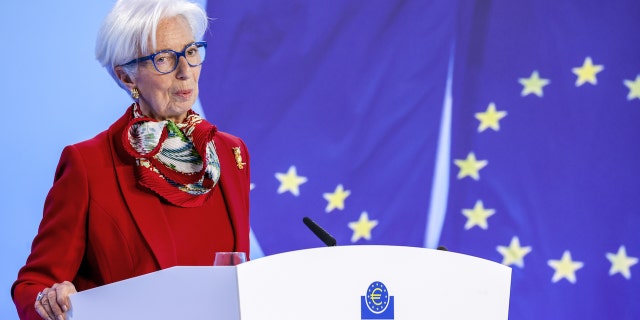One of the world’s largest financial institutions teetering on a full-blown crisis has a Chinese Communist Party-linked individual on its risk management team.
On Wednesday, Swiss bank Credit Suisse’s value plummeted nearly 30%, forcing trading to be abruptly halted midday, after it acknowledged in its annual report it had “material weakness” and its largest investor, a Saudi state-run bank, said it couldn’t provide additional assistance, citing a “regulatory issue.”
Then, on Thursday, Credit Suisse said it intended to borrow a staggering $54 billion from the Swiss National Bank as an unprecedented lifeline to boost its liquidity.
“These measures demonstrate decisive action to strengthen Credit Suisse as we continue our strategic transformation to deliver value to our clients and other stakeholders,” CEO Ulrich Koerner said in a statement. “My team and I are resolved to move forward rapidly to deliver a simpler and more focused bank built around client needs.”
CREDIT SUISSE SHEDS NEARLY 25%, KEY BACKER SAYS NO MORE MONEY
Credit Suisse’s company’s office is photographed in Singapore on Thursday. (Nicky Loh/Bloomberg Getty Images)
According to its website, though, Shan Li, an individual with extensive ties to the Chinese Communist Party (CCP), has been a board member of the bank with senior roles on its risk management team, Asia advisory council and compensation committee since 2019.
Credit Suisse’s website also boasts of Li’s wide-ranging experience with Chinese government-affiliated companies. For example, he is a board member of the Silk Road Finance Corporation which aims to promulgate the Chinese government’s Belt and Road Initiative influence campaign, and previously held high-ranking positions at the China Development Bank and Bank of China, both of which are state-owned.
CEO OF FORD-PARTNERED CHINESE EV BATTERY COMPANY HAS TIES TO CCP ‘UNITED FRONT’ APPARATUS
Li’s profile page also shows that he is a member of the Chinese People’s Political Consultative Conference (CPPCC) National Committee, a key cog in the CCP’s “United Front” influence campaign apparatus. According to a U.S. government report published in 2018, the CPPCC is a “critical coordinating body” that brings together representatives of Chinese interest groups and is led by the CCP’s Politburo Standing Committee.
“The CPPCC, an advisory committee ‘under the leadership of the [CCP],’ is the highest-ranking entity overseeing the United Front system,” stated the report which was assembled by the United States-China Economic and Security Review Commission, an independent federal agency.
“The United Front strategy uses a range of methods to influence overseas Chinese communities, foreign governments, and other actors to take actions or adopt positions supportive of Beijing’s preferred policies,” the report added. “A number of official and quasi-official entities conduct overseas activities guided or funded by the United Front including Chinese government and military organizations.”

Christine Lagarde, the president of the European Central Bank (ECB), speaks to reporters in Frankfurt, Germany, on Thursday. The ECB assured consumers earlier that the “euro area banking sector is resilient, with strong capital and liquidity positions.” (Alex Kraus/Bloomberg via Getty Images)
The CPPCC has also demonstrated an ability to infiltrate other institutions impacting the U.S. economy. The CEO of a massive Chinese tech company that entered into a high-profile deal to assist Ford Motor Company with producing batteries for its electric vehicles last month is also a member of the CPPCC, Fox News Digital reported at the time.
Meanwhile, the near failure of Credit Suisse, which followed the collapse of the California-based Silicon Valley Bank, sparked fears of a full-blown global banking crisis and called into question the safety of the global banking system. The European Union attempted to assuage concerns by affirming the banking sector remained “resilient,” but Bloomberg reported the U.S. government closely monitoring the situation.
CHUCK SCHUMER, DEMS RUSH TO GIVE BACK DONATIONS FROM SILICON VALLEY BANK CEO
The Financial Stability Board, an international that monitors global financial systems, notably lists Credit Suisse as among 30 institutions that are “systemically important.”
But in recent years, Credit Suisse has endured several scandals and vowed to overhaul its risk management operations. In June 2022, the bank announced it would move forward with the major overhauls as it also grappled with litigation costs associated with the collapse of the former New York City-based Archegos Capital Management firm, CNBC reported.
Now, Credit Suisse is facing legal action from U.S. shareholders who allege the Swiss Bank failed to disclose its financial woes and violated securities laws.
Class action lawsuits have been filed against Credit Suisse in federal court, alleging the bank made false or misleading statements about its finances and failed to adequately disclose that it suffered from a “significant” increase in customer outflows at the end of 2022. A newly filed suit includes those claims, plus a claim related to material weaknesses in Credit Suisse’s internal financial controls.
Credit Suisse didn’t respond to Fox News Digital’s request for comment.
Fox News’ Eric Revell contributed reporting.